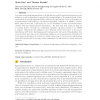Free Online Productivity Tools
i2Speak
i2Symbol
i2OCR
iTex2Img
iWeb2Print
iWeb2Shot
i2Type
iPdf2Split
iPdf2Merge
i2Bopomofo
i2Arabic
i2Style
i2Image
i2PDF
iLatex2Rtf
Sci2ools
420
click to vote
APPROX
2015
Springer
2015
Springer
Weighted Polynomial Approximations: Limits for Learning and Pseudorandomness
Low-degree polynomial approximations to the sign function underlie pseudorandom generators for halfspaces, as well as algorithms for agnostically learning halfspaces. We study the limits of these constructions by proving inapproximability results for the sign function. First, we investigate the derandomization of Chernoff-type concentration inequalities. Schmidt et al. (SIAM J. Discrete Math. 1995) showed that a tail bound of δ can be established for sums of Bernoulli random variables with only O(log(1/δ))-wise independence. We show that their results are tight up to constant factors. Secondly, the “polynomial regression” algorithm of Kalai et al. (SIAM J. Comput. 2008) shows that halfspaces can be efficiently learned with respect to log-concave distributions on Rn in the challenging agnostic learning model. The power of this algorithm relies on the fact that under log-concave distributions, halfspaces can be approximated arbitrarily well by low-degree polynomials. In contrast,...
Related Content
| Added | 16 Apr 2016 |
| Updated | 16 Apr 2016 |
| Type | Journal |
| Year | 2015 |
| Where | APPROX |
| Authors | Mark Bun, Thomas Steinke |
Comments (0)

